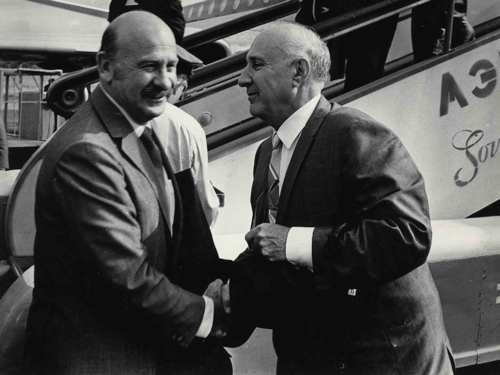Composer Dimitri Tiomkin’s work as a film producer is often overshadowed by his music scores for classic Hollywood films. Knowledgeable film music fans may recall Tiomkin executive-produced Tchaikovsky and arranged the music as well. The film garnered a nomination for an Academy Award in the foreign language film category. In addition to producing that film he spent considerable time during the 1960s developing film projects.
Last month we looked at the time and effort spent by Tiomkin toward a film, eventually abandoned, based on the life of Marco Polo that he hoped to score. This month we examine Tiomkin’s fascinating attempt to bring Roman Goul’s 1931 Russian novel, Azef, to the big screen.
Tiomkin considered himself a sincere admirer of Goul’s talent and work and the two had mutual friends in Akim Tamiroff and George Annenkov.
Roman Goul (1896–1986), sometimes written Gul, was a Russian émigré writer. He took the same path out of Russia as Tiomkin, settling in the U.S. in 1950 after living in Berlin in the 1920s and Paris from 1933.
READ MORE: Roman Goul papers at Amherst College
Goul’s 1929 novel General Bo was republished under the title Azef in 1931. He optioned the book to the Victoria Film Company in Paris in 1947 but that came to naught and by 1955 Goul sought to recapture the film rights.
Writing from Petersham, Massachusetts in July 1963, Goul penned a friendly letter to Tiomkin in Russian with information about Azef.
Tiomkin replied noting they shared the same publisher in Doubleday. The two arranged to meet in New York in late August. At that time Tiomkin also met with Doubleday managing editor Timothy Seldes. (The son of jazz critic Gilbert Seldes, Timothy went on to become a notable literary agent for the likes of Anne Tyler and others.) After the meeting Seldes relayed to Goul that Tiomkin was no longer interested in obtaining the motion picture rights to Azef.
This may have been a negotiating tactic because Tiomkin soon asked Alexander Merovitch to broach monetary terms with the writer. Merovitch, a New York-based Russian-born impresario, managed Vladimir Horowitz, Gregor Piatigorsky, and French conductor Vladimir Golschmann who conducted the European premiere of Gershwin’s Concerto in F at the Paris Opera with Tiomkin at the piano.
READ MORE ABOUT THE PARIS CONCERT: The story of musician Arthur Zepp, Dimitri Tiomkin’s personal assistant
Merovitch reported back with a progress report to Tiomkin in September.
On October 1, 1963, an option agreement was drafted by attorney Harry Sokolov for Tecisa Productions allowing for Tiomkin to purchase the motion picture, television, and radio rights to Azef.
That same day Tiomkin fired off a letter to his producing partner Lester Welch in Madrid, Spain, asking him to sign. Welch was apparently on his way to London to score the Tecisa picture, Gunfighters of Casa Grande, released the following year.
Meanwhile Sokolov sent the agreement to Merovitch. By the end of October Merovitch hammered out negotiated points with Goul and wrote to Tiomkin that Doubleday was offended that they were left out of the discussions.
Rights can be complicated and in this instance Doubleday only controlled the rights to their English language translation of Azef.
Because Doubleday did not control the original Russian work nor did it control any right in any other editions known to exist, and there were many, the lawyers for Doubleday recommended that the company not enter into any agreement for motion picture rights unless its liabilities thereunder were severely restricted.
That apparently put a damper on things and there is no further communication for more than a year.
In April 1965 Lester Welch is surprised to learn from reading Variety that Tiomkin has teamed with Carl Foreman. (The trade paper reported that Tiomkin was joining Foreman’s High Road Productions as a producer and with Foreman as co-producer would put Mackenna’s Gold into work for Columbia as his first assignment.)
A two-page typewritten letter signed “Soloweitjczyk” [Soloweijczyk] in June 1965 outlines potential cast members. Citing the Peter O’Toole and Richard Burton relationship in Beckett, the writer suggests for Azef: Peter Ustinov or Orson Welles and for Savinkov: Albert Finney or Peter O’Toole.
I’m just nuts about this book and believe it could make the damnedest picture of international intrigue, hopping from Moscow to Petersburg to Paris to Geneva to Berlin to Sevastopol – lots of sex and, most important of all, great fascinating characters involved in the goddamedest [sic] machinations risking life and limb, torture and imprisonment in answering violence with violence.
During the summer of 1965 Tiomkin approached Yul Brynner to director the project. In writing to Brynner, Tiomkin repeats most of the points made by Soloweitjczyk.
Brynner writes back to Tiomkin from Switzerland. While expressing interest in directing he tells Tiomkin that a bold treatment of the story is needed first.
In March 1966 Tiomkin contacts Kirk Douglas and asks the actor to consider the role of Savinkov.
Tiomkin also sends Azef to director Lewis Milestone who found the book as exciting as when he read it some thirty years previous.
Warner Bros. publicist Max Bercutt, who worked on Giant and Tchaikovsky, wrote to Tiomkin in June 1966.

Dimitri Tiomkin with Max Bercutt
Bercutt suggests waiting to make Azef for two or three years, as “there is already a heavy subject about the Soviet Union, namely Doctor Zhivago, and War and Peace coming out, etc.”
The last item in Tiomkin’s file on the project is an unopened registered letter from August 1966 Tiomkin sent to himself to protect his rights in the project.
Sources
Correspondence courtesy of Olivia Tiomkin.
Variety, April 21, 1965













